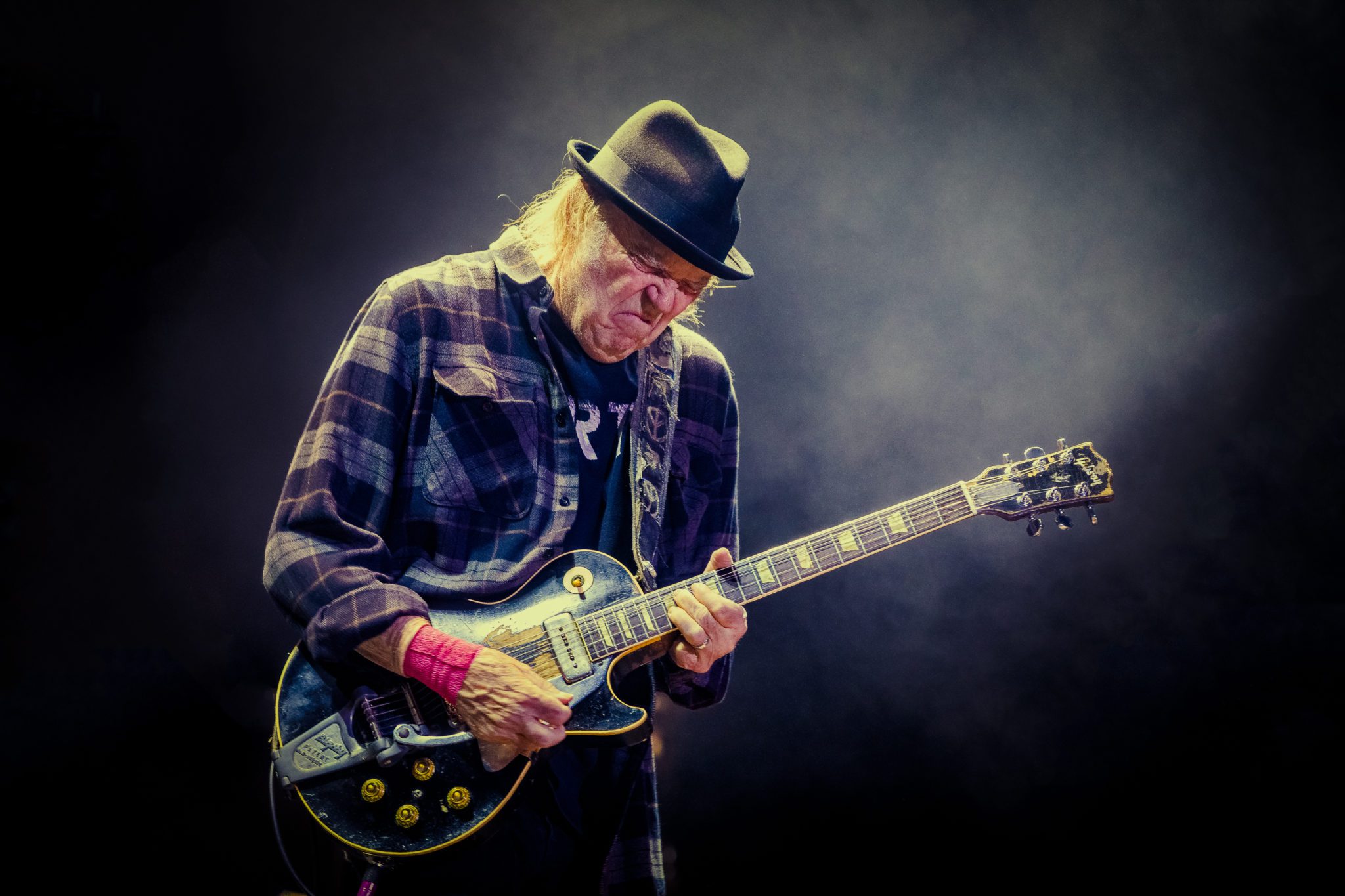I Heard Ol’ Neil
Politically, Young is nothing if not Whitmanesque, containing multitudes.

Prepping for a molasses-slow crawl up the Queen Elizabeth Way to Toronto in hopes of seeing 78-year-old Neil Young bash out “Powderfinger” and caterwaul “Like a Hurricane,” I reread two essential texts of Canadiana: Jimmy McDonough’s Young biography Shakey (2002), the best rock’n’roll bio I have ever read (admittedly, the field is fallow), and the philosopher George Grant’s Lament for a Nation (1965), the meditation of a “Red Tory” on the absorption of Canada into the economic and military sphere and “homogenized culture of the American Empire.”
Grant’s 92-page masterpiece was occasioned by the defeat of the progressive conservative prime minister (1957-1963) John Diefenbaker, a small-town Saskatchewan attorney who had defied Kennedy administration Cold Warriors by rejecting the placement of nuclear-tipped missiles in Canada. His advocacy of a “kind of neutralism, a simple refusal to accept any demand from the present imperialism” brought “the full weight of the North American establishment” down upon poor Diefenbaker.
Sophisticated Canadian liberals played the role of Uncle Sam’s lapdog in these debates while the hayseed Diefenbaker, with his rural and provincial base of support, stood manfully against the colossus. “The election of 1963 was the first time in our history,” marveled Grant, that “a government was brought down for standing up to the Americans.”
The low-brow analogue of this expression of old-style Canadian conservatism might be the Guess Who’s anthem of Great White North anti-Americanism, “American Woman”—“I don’t need your war machines/I don’t need your ghetto scenes”—cowritten by Neil Young’s old buddy from the Winnipeg bar scene, Randy Bachman. Of course George Grant understood that a healthy nationalism—or, much better, a healthy patriotism—is grounded in love and loyalty, not resentment or simple-minded anti-ism.
Growing up 40 miles from the border, I have long had off-kilter, something’s-not-quite-right Canuck sounds tickling my ear, thanks largely to local-content rules requiring Canadian radio to serve up Leonard Cohen and the Poppy Family and Martha and the Muffins alongside the American buffet. George Grant would approve of the intent, if not the tunes.
Son of a mismatch between a philandering novelist/sportswriter and a Manitoba harridan, Canadian expatriate Neil Young didn’t need local-content regulations to invade the radio. The high-school dropout lit out for California at the age of 20, falling in with druggy scamps who probably couldn’t have read one of his dad’s hockey novels for boys, let alone works by his old man’s Canadian litterateur friends (Robertson Davies, Farley Mowat). Yet over a remarkably productive half-century, Neil Young has churned out beautifully ragged ballads and sonic booms whose evocative (if sometimes clumsy) lyrics bespeak a strange and dreamy peace-and-love flannel-shirted rural orneriness.
He was in fine form in Toronto, a high-rise city that has effaced its past and doesn’t seem bothered by it in the least. Buttressed by an octogenarian rhythm section, the aptly surnamed Young pounded out an ear-crunching “Hey, hey, my, my, rock and roll will never die,” and one might almost believe that the singer will outlive the genre.
Young’s Covid-deranged hissy fit about podcaster Joe Rogan’s willingness to interview medical outlaws was uncharacteristic, so let’s write that off as a favor to his friend and fellow expat Joni Mitchell. We all deserve a few mulligans, don’t we? Young has generally shied from political polemics, though his godawfully preachy early 1970’s numbers “Southern Man” and “Alabama” rival John Lennon’s “Imagine” in triggering one’s kill-the-radio impulse. (Neil, being Neil, sometimes wore a Confederate uniform in his days with the 1960’s band Buffalo Springfield.)
In any event, the Southern patriots Lynyrd Skynyrd offered an enduring retort: “I heard Mr. Young sing about her/I heard ol’ Neil put her down/I hope Neil Young will remember/A Southern man don’t need him around, anyhow.” (Neil later regretted his self-righteous bilge.)
Politically, Young is nothing if not Whitmanesque, containing multitudes. Elliot Roberts, his late manager, explained: “Neil is more American than anyone, even though he’s Canadian….Neil’s an isolationist. I mean, if it were up to him, we’d have no foreign aid, we’d talk to no one, we’d really deal with no one else—‘If they can’t cut it, f--- ‘em.’ Neil is extreme….One minute he’s a leftist Democrat, and the next minute he’s a conservative.”
Doesn’t that describe most people who haven’t been ventriloquized by Fox or MSNBC? (Greendale, his raucous 2003 album depicting a ranching family vs. the world, captures Young’s family-values-meet-Earth-First!-environmentalist orientation. It breathes Edward Abbey.)
Subscribe Today
Get daily emails in your inbox
Neil Young’s 2005 album Prairie Wind, written and recorded as he awaited brain surgery and pondered mortality, conjured the pastoral Canadian memories of his youth.
“It’s a dream, it’s only a dream,” he lamented, “and it’s fading, fading away.”
Patriots of Neil’s two countries know the feeling.